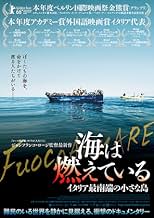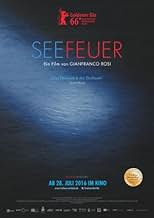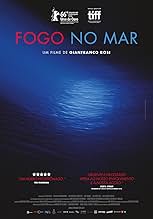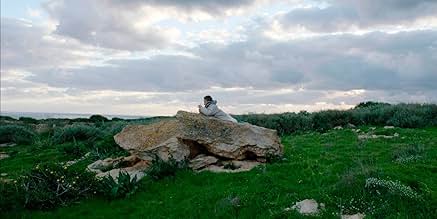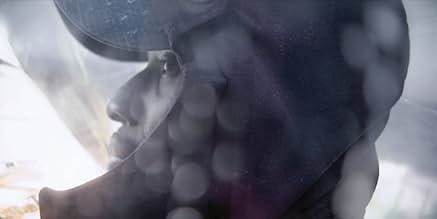Capturing life on the Italian island of Lampedusa, a frontline in the European migrant crisis.Capturing life on the Italian island of Lampedusa, a frontline in the European migrant crisis.Capturing life on the Italian island of Lampedusa, a frontline in the European migrant crisis.
- Director
- Writers
- Stars
- Nominated for 1 Oscar
- 16 wins & 28 nominations total
- Director
- Writers
- All cast & crew
- Production, box office & more at IMDbPro
Featured reviews
So the common thing in the film is the Sea that divides the two continents, Europe and Africa. This film sets around that region about the people who depended on it for the living, growing up and looking for the fresh life start. But the majority of those who saw it recognise only the refugees who cross the sea. That's wrong to label this film is about the refugees. Around 20-25 per cent of the film concentrated on that issue. Only about their struggle on their journey to the other side, but it reveals nothing on its root cause. If you ask me, I would say only one religion making all this mess in the middle-east, otherwise you won't see the western army in that region.
Some of the clips, the real ones are really disturbing. I won't blame those people who took such risk to get the other side of the sea. Believe me, I'm not a nationalist, so I won't believe in borders and regions that divided over language and ethnicity base. But I do mind the religious. If that was eradicated from the earth's surface, particularly one that's causing all the trouble immediately, we can co-exist peacefully. That's the major issue here, but we're after temporary solution. The film does not say all this, but you will get the clear picture.
"The ships fired rockets and at sea. It was like there was fire at sea."
For me this was an average film. I have seen the much better documentaries than this on various issues of the world. The filmmakers don't want to take sides, so they only revealed the truth by just following and making videos of life in and around the Mediterranean Sea. Like I meantioned earlier, some of the angles do not make any sense or difficult to understand its purpose. I don't know the others, but I have got plenty of questions about the film to ask the filmmakers. If you are like me, welcome aboard.
It was the Italian entry for the 2017 Oscars and it did not make, but found a slot in the list of Best Documentary Feature. This is the first out of five from that category I have seen, so I don't know whether it wins the award or not, but as per the prediction made by film fanatics and critics, this is the frontrunner.
Whatever the result would be, I'm not recommending it particularly the common people. Because the film fails to narrate the story which is very essential from the average peoples' perspective to get the message clear and loud. All one can get with this is only the outline on the very important issue at the moment. Remember how the David Attenborough's narration made to reach all the corners of the earth. Confusing over the purpose of the documentary, possibly misleading. Its like watching a news channel on the mute mode. Otherwise, this should have been one of the best of its kind.
5/10
The film did show the comfortable orderly lives of the islanders and their comfortable homes, contrasting with the destitution of the migrants who have lost everything - their homes, jobs, family members and face an uncertain future after a hazardous and sometimes deadly journey, but other than the doctor, no one seemed particularly bothered.
Questions which were not answered, where are the migrants getting all the money for the journey, which seems to cost around $10,000 and more. Just the boat trip from Libya to Lampedusa costs between $1,500 and $850 depending on your place in the boat, and seeing as most of the migrants are from Central Africa, getting to Libya must cost ten times more. What are the smugglers doing with all their money which must run into hundreds of millions by now. Where is it being laundered. What is being done to catch the smugglers? Are the migrants really in peril and facing death, or are they being enticed by the people smugglers with false claims of a land of milk and honey. If the latter, why are they not writing (or phoning on the ubiquitous cell phones) to warn their friends and family not to come? Perhaps it is compassion fatigue, but as we saw the dead migrants being unloaded from the tiny overcrowded boat, I was reminded of the cry of 'Bring out your dead' in the days of the plague.
We see the Italian navy rescuing migrants from their sinking overcrowded boats and dinghies; many of them are in a desperate condition after days at sea. We get glimpses of the 'internment camp'where they wait to be processed and sent on to their uncertain future in a Europe which is increasingly unwelcoming.
Alternating with the refugee crisis, the film's main focus is Samuele, a 12-year-old Lampedusan who lives with his fisherman father and grandmother. The family play themselves in the style of a Pasolini movie (minus the sex and the blasphemy). We watch Samuele slurping spaghetti, struggling with homework, playing with a slingshot. They seem to have a very limited awareness of the migrant situation, although that is perhaps only the director's way of pointing up the contrast between the ordinariness of their lives and the appalling tragedy taking place in the waters around their island.
This heart-wrenching film offers no solution to the crisis. How could it? There clearly isn't one.
Did you know
- TriviaDirector Gianfranco Rosi did his own cinematography again, but used for the first time an ARRI Amira camera, which he said allowed him to shoot in dark environments: "Sometimes it looked like we had an incredible amount of light. Technology helped me a lot on this film. Being able to work with this tiny camera by myself was an incredible tool." [2016]
- Quotes
Nigerian Refugee: This is my testimony... We could no longer stay in Nigeria. Many were dying. Most were bombed... We flee from Nigeria. We ran to the desert. We went Sahara Desert and many died... Raping and killing many people, and we could not stay. We flee to Libya. And Libya was a city of ISIS. And Libya was a place not to stay... On the journey on the sea, 200 passengers died. They got lost to the sea. A boat was carrying 90 passengers. Only 30 were rescued, and the rest died. Today we are alive...
- ConnectionsFeatured in Subject (2022)
- How long is Fire at Sea?Powered by Alexa
Details
- Release date
- Countries of origin
- Official sites
- Languages
- Also known as
- Fire at Sea
- Filming locations
- Production companies
- See more company credits at IMDbPro
Box office
- Gross US & Canada
- $120,933
- Gross worldwide
- $1,178,377
- Runtime1 hour 54 minutes
- Color
- Sound mix
- Aspect ratio
- 1.85 : 1
Contribute to this page


![Watch Trailer [OV]](https://m.media-amazon.com/images/M/MV5BNmQ3ZjU0NzktZWFmNi00YzMxLTg1N2UtMGM3ZTgwMDU3OWJlXkEyXkFqcGdeQXRodW1ibmFpbC1pbml0aWFsaXplcg@@._V1_QL75_UX500_CR0)


